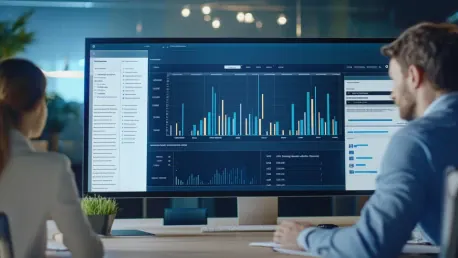In today’s fast-paced legal environment, the adoption of legal project management software has become a game-changer for law firms and legal departments. These tools are designed to streamline workflows, enhance collaboration, and ensure that legal teams can operate efficiently, regardless of their geographical locations. The integration of such technology is not just a trend but a necessity for modern legal practice. As legal professionals seek to manage increasing volumes of information and maintain high standards of service, leveraging technology becomes essential. Legal project management software is no longer perceived as optional but rather as an integral part of efficient operations.
The ability to organize and track the myriad of tasks, documents, and communications involved in legal work is critical to achieving successful outcomes. With the right software in place, legal teams can manage their workflows more effectively, reduce the risk of errors, and ensure that deadlines are met. By providing a centralized platform for collaboration and information sharing, legal project management software also helps teams to stay connected and maintain high standards of communication. This not only enhances the overall efficiency of legal operations but also improves the quality of service delivered to clients.
Essential Legal Technology
Legal project management software has become indispensable for efficient legal practice as it offers a range of features that are crucial for managing legal projects effectively. These tools typically include functionalities such as team messaging, task dashboards, multiple-user work applications, document management systems, and version control. By consolidating these features into a single platform, legal teams can streamline their workflows, promote efficient collaboration, and enhance overall productivity. The comprehensive nature of these tools ensures that all aspects of a project are organized and accessible in one place.
The ability to manage tasks, documents, and communications in one place significantly reduces the risk of mismanagement and ensures that nothing falls through the cracks. This is particularly important when multiple team members are working on a case, as it helps prevent duplication of efforts and ensures that everyone is on the same page. The integration of these tools into daily practice has become a cornerstone of modern legal operations, allowing teams to work more cohesively and efficiently. By providing a holistic view of all activities and progress, project management software supports better decision-making and strategic planning.
Moreover, legal project management software is designed to foster seamless collaboration among team members, regardless of their physical locations. Features such as real-time messaging and collaborative document editing enable teams to work together effectively, even when they are geographically dispersed. This level of connectivity is crucial in today’s globalized world, where legal teams often need to coordinate across different cities, states, or even countries. By providing the tools necessary for effective remote collaboration, legal project management software ensures that geographical barriers do not hinder the ability to deliver high-quality legal services.
Benefits of Legal Project Management Software
One of the primary benefits of legal project management software is the consolidation of resources. By bringing together emails, tasks, documents, and team collaboration tools into a central location, these platforms mitigate the risk of mismanagement. This unified approach ensures that tasks are not overlooked or duplicated, which is crucial for maintaining efficiency and accuracy in legal work. Having all relevant information in one place allows for easier tracking of progress and better oversight of all ongoing activities.
Enhanced communication is another significant advantage. With embedded chat and contextual notes, legal project management tools facilitate real-time communication and feedback. This feature prevents the chaos of fragmented email chains and ensures a transparent flow of communication, where all team members can stay informed and updated. The ability to have all communications in one place also makes it easier to track the progress of a case and ensure that deadlines are met. The transparency provided by these tools helps to create a more cohesive and proactive team environment.
Remote access to materials is a game-changer for legal teams. Legal project management tools enable remote accessibility, allowing team members to collaborate and share knowledge seamlessly from anywhere with an internet connection. This capability is particularly beneficial in creating efficient legal workflows by reducing the time required for file transfer and information sharing. It also provides the flexibility needed in today’s work environment, where remote work has become more common. The ability to access critical information and tools from any location ensures that legal operations can continue uninterrupted, regardless of external circumstances.
Furthermore, the consolidation of resources within a single platform eliminates the need for juggling multiple applications and systems, simplifying the user experience for legal professionals. This integration reduces the learning curve associated with new technologies, allowing teams to adopt and start benefiting from the software more quickly. Additionally, centralized tools for document management and version control help prevent common issues such as duplicate files, outdated information, and inconsistent document formatting. This leads to more accurate and professional outputs, boosting the overall quality of the legal service provided.
Addressing Security Concerns
While the benefits of legal project management software are clear, there are also inherent risks, particularly related to security and confidentiality. The ability to access and share data from multiple devices can make it difficult to regulate and monitor, increasing the vulnerability to cyberattacks. This is a significant concern for legal teams as they handle sensitive and confidential information that must be protected at all costs. Failure to safeguard this information can result in severe consequences, including loss of client trust, legal penalties, and financial losses.
To address these concerns, solutions like Dashboard Legal have been developed with a focus on security. Dashboard Legal offers role-based access control, ensuring that only authorized personnel can access sensitive information. This feature allows team members to manage access to their resources, providing an additional layer of security. Multi-factor authentication and password policies further ensure that only verified users can access the system, reducing the risk of unauthorized access. These measures provide robust protection against common security threats and help to maintain the integrity of confidential data.
Audit logs are another critical feature of Dashboard Legal. These logs maintain records of all administrative actions, which are searchable and exportable for audit purposes. This capability ensures that any changes or access to sensitive information can be tracked and reviewed, providing transparency and accountability. Additionally, the option to host the software on Bloomberg Law’s servers or deploy it in a single-tenant virtual private cloud (VPC) ensures compliance with data governance requirements. These options allow legal teams to choose the deployment method that best suits their specific security and regulatory needs.
The implementation of such stringent security features is crucial in maintaining client trust and ensuring compliance with various data protection regulations. By prioritizing security, legal project management software like Dashboard Legal helps legal teams to confidently embrace technological advancements without compromising on the confidentiality of their work. These measures also demonstrate to clients that their information is being handled with the highest standards of care and professionalism, strengthening the client-lawyer relationship.
Infrastructure and Data Management
In today’s rapidly evolving legal landscape, legal project management software has become a pivotal tool for law firms and legal departments. These solutions are crafted to optimize workflows, boost collaboration, and ensure legal teams operate efficiently, no matter where they are located. Incorporating such technology is more than just a trend; it’s a necessity for contemporary legal practices. As legal professionals handle growing information volumes and strive to uphold high service standards, using technology becomes indispensable. Legal project management software is viewed as essential, not optional.
Effectively organizing and tracking the multitude of tasks, documents, and communications involved in legal work is vital for achieving successful outcomes. With the appropriate software, legal teams can manage workflows more efficiently, minimize errors, and meet deadlines consistently. Offering a centralized platform for collaboration and information sharing, legal project management software keeps teams connected and ensures high communication standards. This enhances overall efficiency in legal operations and improves client service quality.









